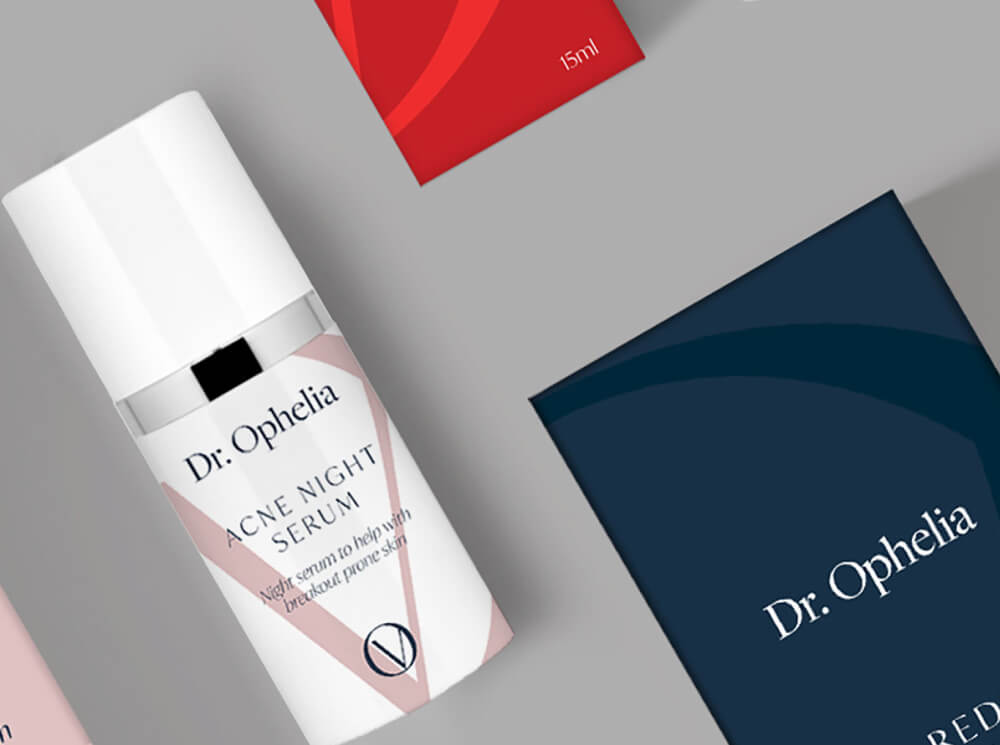Skin health
Acne
Acne is becoming increasingly common. It doesn't just affect teenagers; younger children and older adults can also suffer from the condition. Acne is characterized by blockage and inflammation of the hair follicles. Acne most commonly affects the face, but can affect the chest and back. An associated condition is seborrhoea characterized by excessive oil production on the nose, forehead and chin. When pores become blocked the skin produces open comedones (blackheads) and closed comedones (whiteheads). When these blocked pores become inflamed, they progress to papules, pustules, cysts and nodules. As the inflamed acne recovers, post inflammatory pigmentation and scarring can be evident.
There are multiple triggers for acne including hormonal factors, inherited predisposition (acne tends to run in the family), bacterial infection and the use of heavy and occlusive skincare. Whatever the cause Dr. Ophelia fully understands how acne can negatively impact one’s self-image and emotional wellbeing.
In a consultation with Dr. Ophelia she will examine your skin care regime, general health and genetic disposition, in order to uncover the principal causes of your acne. She will curate a treatment plan suitable for you, which may include the following treatments: light or laser based therapies, chemical peels, topical or oral treatments.
Rosacea
Rosacea presents as redness, inflammation or flushing in the central face. Genetic and environmental factors are important in the development of rosacea. Rosacea can be associated with excessive sun exposure and the presence of the hair follicle mite Demodex folliculorum. Flares of rosacea can be triggered by alcohol, stress, exercise, changes in temperature and spicy foods. Patients often report that their rosacea has a detrimental effect on their self-confidence.
If Rosacea is diagnosed, Dr. Ophelia will formulate a personalized skincare plan for you. This may include prescription only topical or oral medications to help with the redness and inflammation caused by rosacea. In addition, Dr. Ophelia may decide you will benefit from a course of light or laser based therapies. Intense pulsed light (IPL) is one of our most popular treatments to clear up redness, inflammation and age related pigmentation. For stubborn areas of redness, more targeted vascular lasers such as NdYAG and pulsed dye laser (PDL) can be used. An ablative CO2 laser can be used to treat the nose enlargement that can be associated with rosacea.
Eczema
Eczema is an itchy, dry skin condition. Normally eczema is cause by a genetic predisposition to inflammation and an impaired skin barrier function. Patients with eczema often have a personal or family history of other atopic conditions such as asthma or hay fever. There are many factors that can cause eczema flare-ups; these include, stress, air-borne allergens and contact allergens, infections and sunlight.
Fortunately, most patients with eczema can now be treated effectively. Dr. Ophelia will develop a clear skincare plan and, in those with milder eczema, she may recommend the use of a regular emollient (moisturiser). For those with more significant disease, active topical treatments can be effective. In some cases a reducing regimen and maintenance therapy is the key to controlling the skin inflammation and reduce the flaring pattern that may occur. For those with more severe disease, light therapy, oral or injection immunosuppressants are highly effective treatments.
Urticaria (hives, wheals)
Urticaria is typically a raised, itchy rash that occur in different parts of the body that resolve in 24 hours. Urticaria is caused by mast cells in the skin releasing chemical mediators, including histamines. These mediators cause dilation of blood vessels and leakage of fluid into the surrounding tissue. Angioedema, a deeper swelling, is associated with bradykinin release and present in around 10% of urticaria cases. In most cases of chronic urticaria the cause is unknown. However, there are rare types of chronic urticaria that are triggered by heat, cold, light, pressure, water and stress.
In such cases, Dr. Ophelia will make a clinical diagnosis. She may require photographs of past flare-ups to be used to discuss past history (please bring them to your appointments). Sometimes blood tests or a skin biopsy might be required to confirm the diagnosis and to exclude any other potential co-existing conditions.
Psoriasis
Psoriasis is a skin condition that presents as well-defined, scaly plaques. Psoriasis can occur anywhere on the body, but when it affects the scalp, genitals or nails it can be particularly problematic for patients. Psoriasis is triggered by both genetic and environmental factors. These include; smoking, obesity, stress, alcohol excess, infections and medications. Psoriasis usually has a significant impact on a patient’s quality of life.
In your personalised skincare plan Dr. Ophelia may prescribe topical therapies for your psoriasis. Alternatively, for those unable to control their psoriasis with topical therapies, she will discuss with you the varied treatment options available, such as light therapy, oral or injection therapies. She will also explore with you counseling on lifestyle factors, such as smoking, alcohol and weight management.
Vitiligo
Vitiligo is an autoimmune condition where there is loss or destruction of the pigment producing cells (melanocytes). It is associated with other autoimmune disorders, such as thyroid disease. Typically you get milky white patches of skin, and this is more noticeable in patients with darker skin types. Dr. Ophelia will usually make a clinical diagnosis of vitiligo, but occasionally a skin biopsy is advised to exclude other causes of loss of skin pigment.
Dr. Ophelia will discuss all treatment options available. These include topical treatments or light therapy. She may also recommend sun protection, skin camouflage and psychological support.
Melasma
Melasma is a condition that causes light brown pigmentation, usually on the face. It is more common in women, though men can also be affected. It is also more common in darker skin types, where there is often a family history of the condition. Melasma is usually more prominent in the summer months and fades in winter. There are several factors that can cause melasma; genetics, sun exposure, birth control pill, pregnancy and some medications.
Dr. Ophelia recognizes the importance of treating this condition early. She will recommend that melasma treatment include avoiding triggers such as hormonal therapies and sun exposure. As part of your skincare plan Dr. Ophelia can advise on the use of sun protection, creams targeted at improving pigmentation, as well as skin peels and laser treatment.
Excessive sweating
Hyperhidrosis is excessive and often uncomfortable sweating. It can be localized to specific areas (commonly armpits, palms or soles) or generalized. Most cases of hyperhidrosis are unexplained, usually starting in childhood or adolescence and may significantly impact a patient’s quality of life
Once underlying health conditions are ruled out, Dr. Ophelia will prescribe the treatment options available. These include antiperspirants, topical creams, tablets and iontophoresis. Botox injections into the affected area are effective in controlling sweating, with the effects lasting for 3-4 months.
Scar treatment
Scarring is the process whereby fibrous tissue is laid down during wound healing. Over the course of 18 months the appearance of a scar will usually improve, however some scars may remain persistently unsightly or uncomfortable. Hypertrophic and keloid scars are raised and lumpy scars. They can be itchy and can extend well beyond the original wound site.
In acne scarring Dr. Ophelia will underline the importance of treating the underlying acne before improvements to the scarring are sought. In most cases once the acne has been treated, the resultant post inflammatory and scarring associated with the acne will improve substantially over a period of months. In a small proportion of acne patients, after the acne has been treated, scarring will persist and require further treatment.
The appearance of all types of scars can often be significantly improved. Dr. Ophelia may recommend a combination of techniques be selected from gels, creams, injections, microneedling and laser based therapies.



